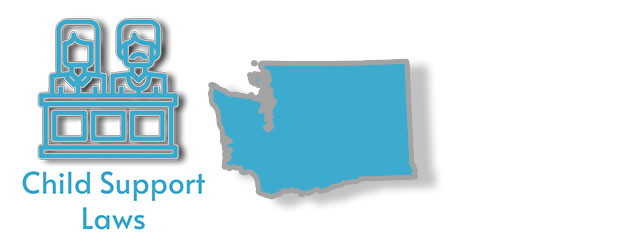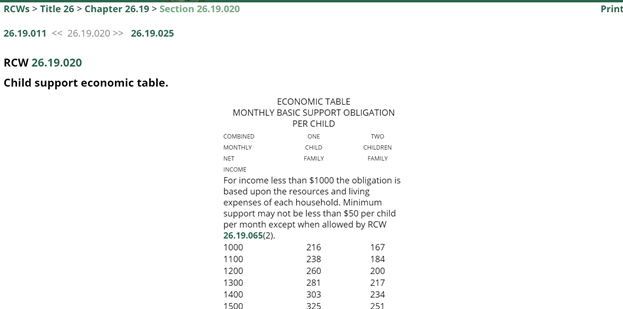
Washington child support laws are unique in that the parent that spends less than 50% parental time pays child support. However, that does not mean that the court cannot order both parents to pay.
Right off the bat, you can tell that the capitol’s upkeep laws are a bit convoluted. The good news is this article clarifies all the important bits that impact you, your child, and your former partner no matter which side of the divide you stand. So, if you are the custodial parent, we explain how to establish child support, enforce it, plus some actionable tips. Whereas non-custodial parents get to learn their rights, legal responsibilities, what to do if you lose your job, how to lower or terminate child support early plus much more.
How to apply for child support in Washington
The Washington State Department of Social and Health Services (DSHS) via the Division of Child Support aims to quote “improve lives by delivering child support services”. what does this mean?
Through various agencies including, the state department and DMV, the Division of Child Support provides upkeep services including paternity and support order establishment, upkeep order review and modification, and all related services. However, the DCS does not provide legal assistance to parents. Thus, if you are facing contempt of court charges for nonsupport or in need of legal advice, you should consult with a family court attorney.
Currently, the department has closed all its offices to walk-in traffic because of COVID-19. Hence, parents who need to enroll for child support services must do it online or via mail. To that end, what you must do is create a DSHS account here, and the department will mail you an application.
Before you complete the application packet, the DCS recommends that you watch the linked video, Or call customer service at 1-800-457-6202.
You may also download the appropriate child support application form here.
What to remember:
- You may locate child support offices or a field office near you here. After you complete your application. Mail it to the Division of Child Central Services P.O. Box 11520 Tacoma, WA 98411.
- The DCS responds to applications within 7 to 10 days. So, make sure that you fill the form accurately and sign or you may have to repeat.
- To receive child support, you must complete the DCS Application for Assistance Support Enforcement Services (18-078) Form, and, or 14-057 Child Support Referral Form.
How is paternity established in Washington?
Washington child support laws provide three ways to establish paternity. The traditional route is Voluntary Acknowledgement of Parentage which happens at the hospital or at the Department of Vital Statistics after childbirth. That means if a man signs that form, the law assumes that you are the father and thus obligated to provide upkeep.
The second option is by court order where one parent files a petition in the superior court asking the judge to order the other parent to take a DNA test. In cases where the accused man is not available, the judge may order a close relative to take a genetic test. the other option is to petition the DCS for administrative establishment. And last, when a child is born to a married couple the man automatically becomes the father.
What to remember:
- If the man acts as a parent for the first four years, the judge may deny a genetic testing request because starting January 1st, 2019. Washington child support laws RCW 26.26A.115 (b) presumes that the man is the father if he openly holds the child as his own for the first four years.
- Paternity establishment grants the child rights including, inheritance, custody/visitation rights, veteran’s benefits, health insurance, and so on. The parents may also seek public assistance after paternity establishment.
- A Voluntary Acknowledgement of Parentage form is only valid if both parents sign it.
How is child support determined in Washington?
In Washington, the courts and DSHS have the authority to issue child support orders. To establish child support, both bodies rely on a standardized child support formula that considers the following factors:
- The number of children in either household.
- A child’s or parents’ disability.
- Taxes and debts.
- The income(s) of both parents.
- Gifts, prizes, and other wealth.
How does upkeep work in Washington?
The court begins the process by calculating the gross monthly income(s) of both parents. Gross income is income from all sources including salaries, wages, bonuses, profits, and all applicable incomes.
After establishing gross income, what the court does next is subtract deductions including social security, taxes, mandatory union dues, and all applicable deductions. From there, the court will cross-reference the resulting gross adjusted income with Washington’s Child Support Economic Table to establish your parental obligation (See the snippet below).

Image1: Washington’s Child Support Economic Table to establish your parental obligation
In practice, the judge has the final say on how much you will pay. Meaning, the priority here is the best interests of the child. What do I mean?
The court or DSHS does not always use Washington Child Support laws when awarding obligation because sometimes the amount is unfair. In such a situation, the judge will deviate. Why?
RCW 26.19.075 says that, quote, “reasons for deviation from standard calculations include but are not limited to:”
- The income of other adults in the household.
- Involuntarily incurred extraordinary debt.
- A significant disparity in the parent’s living costs due to uncontrollable factors.
- Special educational, psychological, or medical needs of the children.
How to calculate child support Washington
To make child support estimation easy for parents in Washington, the DSHS provides two calculation options.
One is the Division of Child Support- Quick Child Support Estimator. And the second option is the Automated Washington State Child Support Schedule Worksheet Calculator.
What to remember:
- Your child support order may be very different from the amount you get using the calculators above.
- The court commissioner, administrative judge, or superior court judge has the final authority to determine upkeep.
- The court may order one or both parents to cover medical care.
- Out of court parental agreements are only valid after court approval.
- The court has the authority to impute income for voluntarily unemployed or underemployed parents.
- Child support minimum in Washington is $50.
How to modify child support in Washington
Whenever a parent’s income changes, or daycare or medical costs change, or if you have another child after your child support order was established. Either parent may petition the court or DCS for a support order review.
The outcome of a support order review is either an increase, decrease, or your obligation may remain the same.
Washington’s child support order modification process is straightforward. What you must do is: download FL Modify 501 or the appropriate form here. Then contact the court where your child support order was issued or the DCS.
What to remember:
- If you have an administrative order served by the DCS, you must complete a 9-280B petition for modification.
- Or if you have a court order, you must complete and sign 9-471 Child support Order Review request.
- If you are unsure of the type of order you have or if you want more information, call 1-800-442-5437).
- Washington child support laws allow parents to petition for order modification at any time.
- The grounds for modification include (1) the change must be at least a 25% increase or decrease of the current order or $100. (2) your upkeep order must be 35 months old since the last review or establishment. (3) the petitioning parent must show a substantial change in financial circumstances.
What happens if you do not pay child support in Washington?
Washington child support laws allow the DCS to include or send an income withholding order to the non-custodial parents’ employers. That is because income withholding in most cases guarantees timely payments.
Regardless, if an income withholding order fails, the DCS or court may use any of the following enforcement tools.
- File liens against the paying parent’s assets: the DCS may attach liens to vehicles, real personal property, real estate, and other properties.
- License suspension: through the DMV and other state agencies, the DCS may suspend or revoke your driver’s, professional, or business license until you honor your obligation.
- The DCS may also collect child support from the paying parent’s bank account or accounts held in other financial institutions.
- The DCS may also turn the case to a private collection agency.
- Credit bureau reporting is an option for the DCS and so is the revocation of the paying parent’s passport.
Depending on the amount of back support owed, the DCS may also refer the case to a US attorney general for a criminal prosecution, or the court might hold you in contempt. What do I mean?
Willful failure to pay child support in Washington is a violation of a family court order, meaning when facing contempt of court charges. The court will schedule hearings where the accused must explain his/her failure.
The good news is jail time is the last resort in child support cases. But it may still happen or the judge might place the parent in a work-release program.
In addition, the judge may also order that you pay a fine for each day you failed to follow a court order. Or payback support owed in full to avoid contempt charges, pay the petitioning parent’s attorney fees and other expenses, or if appropriate, send you to jail.
Custodial parents may Download contempt of court application forms here if the payor refuses to pay.
What is criminal non-support in Washington
RCW 26.20.035 (B) defines non-support as a gross misdemeanor and that crime carries a maximum sentence of 364 days in a county jail or a fine not exceeding $5000.
how long do you have to pay child support in Washington?
Your child support order should contain the date when you will make your last payment.
That said.
Child support typically ends when the child turns 18, gets emancipated, or graduates high school. That means your child support order may continue until your son’s or daughter’s 19th birthday.
How to end child support early in Washington
If the child marries or joins the US military, your child support order terminates automatically. However, payments may continue indefinitely if the child is mentally or physically disabled.
At 14, a minor in Washington may file a lawsuit through a guardian or relative, whereas 16-year-olds may petition the juvenile court for emancipation. If you are interested in emancipation, contact a family court attorney in your area.
More Washington Laws